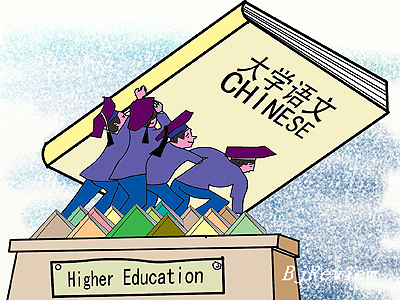
There is a strange "tradition" in China's higher learning, which sees English language courses being compulsory while Chinese, the mother tongue for students, is optional. And paradoxically, failure in the English course may mean students don't get their hands on their coveted diplomas, while failing Chinese has no such penalty.
A continuous decline in the study of Chinese at universities is self-evident, where courses are shrinking or in some cases even suspended, causing a serious dent in the cutting-edge ability of Chinese faculties. As a result, misspelling and improper use of words are increasingly common in dissertations of college students, with some not even knowing what Bopomofos are (Chinese phonetic alphabet).
By contrast, English is all the rage at Chinese universities. As stated, a number of universities have made English a necessity to grant final graduation. And foreign language tests for postgraduates are now also vital. In some cases students who passed major tests, but failed English, could not be admitted for further study.
University students' poor performance in their mother language is a growing concern. More and more educators are calling for the reopening of Chinese courses at universities, something that immediately won the support of the education authorities and other university delegates at a national education forum held at the end of last year. Some of China's top tertiary institutions, such as Peking University, Tsinghua University and Nankai University, have resumed Chinese learning by listing it as a compulsory course.
Most agree that it provides students with more access to their own culture and a more liberal education will breed more knowledgeable and well-educated students.
At the same time, some experts have begun to analyze the deep-rooted causes for the reduction of Chinese learning. It is generally agreed that, currently, most universities are using old teaching methods that are tiresome and impractical. Given the strained job market in China, most university students have abandoned Chinese, turning to other popular courses and foreign languages that can help secure good job offers. Some universities, therefore, have no choice but to cut down credits and time spent on Chinese learning.
Frozen Chinese education and falling Sinology studies have long troubled China's current higher education system, and these issues can hardly be solved in the short term. Some experts acclaimed the compulsory Chinese education, a move to give Chinese a bigger role, as a proactive attitude toward education reform. However, they believe that, it won't be the only solution for Chinese and the tradition renaissance. Pragmatic and individual education will fundamentally help encourage students, arouse their interest in Chinese study and eventually boost traditional culture.
Cherish our mother tongue
Zhang Yuzhe (West China Metropolis Daily): As a result of utilitarianism and the unsteady state of elementary and secondary schools, where admission exams for education of higher levels are overstressed, and of universities, where job-searching is the priority after graduation, Chinese learning has been long ignored. A survey held earlier this year reveals that Chinese is compulsory at merely 40 universities, while a thousand campuses required an English qualification certificate.
Education should be more focused on students instead of market employers. The employment rate is no more than an index that reflects the climate of the job market, rather than the ultimate goal of education. Chinese is so profound that study of the language at universities will make it more complete and efficient.
Ye Zhuyi (www.china.org.cn): As the market economy prevails, and foreign exchanges frequently occur in today's world, languages are of essence in communication. However, one's own language should never be ignored. English is much more favored by almost every university and employer in this world, making the certificates a must for students. It is the same with the postgraduate exams. That's a major reason why a majority of university students are reluctant to spend time and energy on Chinese language learning.
| 